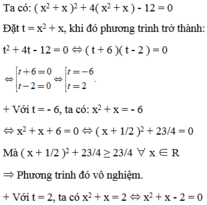Giải phương trình sau (x2+x)2+4(x2+x)-12=0

Những câu hỏi liên quan
Giải các phương trình sau: ( x 2 + x ) 2 + 4 ( x 2 + x ) - 12 = 0

⇔ ( x + 2 )( x - 1 ) = 0 ⇔ 
Vậy phương trình có tập nghiệm là S = { - 2;1 }.
Đúng 1
Bình luận (0)
Giải các phương trình sau:a)
2
x
+
1
2
−
2
x
−
1
2
;
b)
x
2
−
3
x
2
+
5
x...
Đọc tiếp
Giải các phương trình sau:
a) 2 x + 1 2 − 2 x − 1 = 2 ;
b) x 2 − 3 x 2 + 5 x 2 − 3 x + 6 = 0 ;
c) x 2 − x − 1 x 2 − x − 2 = 0 .
giải các phương trình sau
a) x2+4x-5=0
b) x2-x-12=0
c) (2x-7)2-6(2x-7)(x-3)=0
`a,x^2 +4x-5=0`
`<=> x^2-x+5x-5=0`
`<=> x(x-1)+5(x-1)=0`
`<=>(x-1)(x+5)=0`
\(\Leftrightarrow\left[{}\begin{matrix}x-1=0\\x+5=0\end{matrix}\right.\)
\(\Leftrightarrow\left[{}\begin{matrix}x=1\\x=-5\end{matrix}\right.\)
`b, x^2 -x-12=0`
`<=> x^2 +3x-4x-12=0`
`<=>(x^2+3x)-(4x+12)=0`
`<=>x(x+3)-4(x+3)=0`
`<=>(x+3)(x-4)=0`
\(\Leftrightarrow\left[{}\begin{matrix}x+3=0\\x-4=0\end{matrix}\right.\)
\(\Leftrightarrow\left[{}\begin{matrix}x=-3\\x=4\end{matrix}\right.\)
`c, (2x-7)^2 - 6(2x-7)(x-3)=0`
`<=>(2x-7)(2x-7 -6x+18)=0`
`<=>(2x-7) ( -4x+11)=0`
\(\Leftrightarrow\left[{}\begin{matrix}2x-7=0\\-4x+11=0\end{matrix}\right.\)
\(\Leftrightarrow\left[{}\begin{matrix}2x=7\\-4x=-11\end{matrix}\right.\)
\(\Leftrightarrow\left[{}\begin{matrix}x=\dfrac{7}{2}\\x=\dfrac{11}{4}\end{matrix}\right.\)
Đúng 2
Bình luận (0)
a: =>(x+5)(x-1)=0
=>x=1 hoặc x=-5
b: =>(x-4)(x+3)=0
=>x=4 hoặc x=-3
c: =>(2x-7)(2x-7-6x+18)=0
=>(2x-7)(-4x+11)=0
=>x=11/4 hoặc x=7/2
Đúng 0
Bình luận (0)
Giải các phương trình sau:a)
x
−
1
2
−
2
x
+
5
2
0
;
b)
x
2
−
1
−
x
2...
Đọc tiếp
Giải các phương trình sau:
a) x − 1 2 − 2 x + 5 2 = 0 ;
b) x 2 − 1 − x 2 − 2 x − 1 2 = 0 ;
c) x 3 + 8 = − 2 x x + 2 ;
d) 4 x 2 + 8 x − 5 = 0 .
giải phương trình sau: a) (x2 + x)2 + 4(x2 + x) 12;b) x(x-1)(x + 1)(x+2) 24;c) (x-7)(x-5)(x-4)(x-2) 72.
Đọc tiếp
giải phương trình sau:
a) (x2 + x)2 + 4(x2 + x) = 12;
b) x(x-1)(x + 1)(x+2)= 24;
c) (x-7)(x-5)(x-4)(x-2)= 72.
1. Đặt $x^2+x=a$ thì pt trở thành:
$a^2+4a=12$
$\Leftrightarrow a^2+4a-12=0$
$\Leftrightarrow (a-2)(a+6)=0$
$\Leftrightarrow a-2=0$ hoặc $x+6=0$
$\Leftrightarrow x^2+x-2=0$ hoặc $x^2+x+6=0$
Dễ thấy $x^2+x+6=0$ vô nghiệm.
$\Rightarrow x^2+x-2=0$
$\Leftrightarrow (x-1)(x+2)=0$
$\Leftrightarrow x=1$ hoặc $x=-2$
Đúng 1
Bình luận (0)
2.
$x(x-1)(x+1)(x+2)=24$
$\Leftrightarrow [x(x+1)][(x-1)(x+2)]=24$
$\Leftrightarrow (x^2+x)(x^2+x-2)=24$
$\Leftrightarrow a(a-2)=24$ (đặt $x^2+x=a$)
$\Leftrightarrow a^2-2a-24=0$
$\Leftrightarrow (a+4)(a-6)=0$
$\Leftrightarrow a+4=0$ hoặc $a-6=0$
$\Leftrightarrow x^2+x+4=0$ hoặc $x^2+x-6=0$
Nếu $x^2+x+4=0$
$\Leftrightarrow (x+\frac{1}{2})^2=\frac{1}{4}-4<0$ (vô lý - loại)
Nếu $x^2+x-6=0$
$\Leftrightarrow (x-2)(x+3)=0$
$\Leftrightarrow x-2=0$ hoặc $x+3=0$
$\Leftrightarrow x=2$ hoặc $x=-3$
Đúng 0
Bình luận (0)
3.
$(x-7)(x-5)(x-4)(x-2)=72$
$\Leftrightarrow [(x-7)(x-2)][(x-5)(x-4)]=72$
$\Leftrightarrow (x^2-9x+14)(x^2-9x+20)=72$
$\Leftrightarrow a(a+6)=72$ (đặt $x^2-9x+14=a$)
$\Leftrightarrow a^2+6a-72=0$
$\Leftrightarrow (a-6)(a+12)=0$
$\Leftrightarrow a-6=0$ hoặc $a+12=0$
$\Leftrightarrow x^2-9x+8=0$ hoặc $x^2-9x+26=0$
$\Leftrightarrow x^2-9x+8=0$ (dễ thấy pt $x^2-9x+26=0$ vô nghiệm)
$\Leftrightarrow (x-1)(x-8)=0$
$\Leftrightarrow x-1=0$ hoặc $x-8=0$
$\Leftrightarrow x=1$ hoặc $x=8$
Đúng 0
Bình luận (0)
Giải các phương trình sau:a)
2
x
−
1
2
x
−
5
;
b)
7
−
x
−
2
−
3
x
0
;
c)...
Đọc tiếp
Giải các phương trình sau:
a) 2 x − 1 = 2 x − 5 ; b) 7 − x − 2 − 3 x = 0 ;
c) x − 4 + x 2 − 5 x + 4 = 0 ; d) x 2 − x − 2 x + 1 − x = 0 .
Giải phương trình sau: 1/x+2+5/x-2=2x-12/x2-4
\(\dfrac{1}{x+2}\)+\(\dfrac{5}{x-2}\)=\(\dfrac{2x-12}{x^2-4}\)
(đkxđ: x≠2, x≠-2)
⇔ \(\dfrac{x-2}{x^2-4}\)+\(\dfrac{5\left(x+2\right)}{x^2-4}\)= \(\dfrac{2x-12}{x^2-4}\)
⇔ x-2+5(x+2)=2x-12
⇔ x-2+5x+10=2x-12
⇔ 4x=-20
⇔ x=-5(tm)
Đúng 2
Bình luận (0)
1) Giải phương trình: x(x-3)-(x+2)(x-1)=3 ta được nghiệm
2) Phương trình nào sau đây có 1 nghiệm
a) x(x-1)=0 b) (x+2)(x2+1)=0
c) x2-3x=0 d) x2-2x+3=0
1. x(x-3)-(x+2)(x-1)=3 <=> x2 - 3x - x2 - x + 2 = 3 => 4x = -1 => x = 1/4
2.
a) x = 0, x=1 (2 nghiệm, loại)
b) x2 + 1 > 0 => x = - 2 (1 nghiệm, chọn b)
c) <=> x(x-3) = 0 => x = 0, x=3 (2 nghiệm, loại)
d) (x-1)2 + 2 > 0 => Vô nghiệm (loại)
Đúng 0
Bình luận (0)
a) giải phương trình sau ( x2 - 2 x + 1 ) - 4 = 0
\(\Leftrightarrow x^2-2x-3=0\)
=>(x-3)(x+1)=0
=>x=3 hoặc x=-1
Đúng 1
Bình luận (0)
bài 1 giải các bất phương trình sau
a, -x2 +5x-6 ≥ 0
b, x2-12x +36≤0
c, -2x2 +4x-2≤0
d, x2 -2|x-3| +3x ≥ 0
e, x-|x+3| -10 ≤0
bài 2 xét dấu các biểu thức sau
a,<-x2+x-1> <6x2 -5x+1>
b, x2-x-2/ -x2+3x+4
c, x2-5x +2
d, x-< x2-x+6 /-x2 +3x+4 >
Bài 1:
a: \(\Leftrightarrow x^2-5x+6< =0\)
=>(x-2)(x-3)<=0
=>2<=x<=3
b: \(\Leftrightarrow\left(x-6\right)^2< =0\)
=>x=6
c: \(\Leftrightarrow x^2-2x+1>=0\)
\(\Leftrightarrow\left(x-1\right)^2>=0\)
hay \(x\in R\)
Đúng 0
Bình luận (0)




















